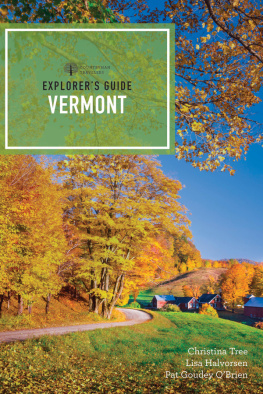Published by The History Press
Charleston, SC
www.historypress.net
Copyright 2017 by Mark Bushnell
All rights reserved
Front cover: Young workers at the American Woolen Company in Winooski, Vermont, pose during their noon break in this 1909 photograph by Lewis Hine. The girls are (left to right) Bernice Bedard, Sadio Finnogan and Tessie McGarth. Courtesy of Fleming Museum of Art, University of Vermont. Gift of Daniel K. Mayers 1979.15.7.
First published 2017
e-book edition 2017
ISBN 978.1.43966.368.4
Library of Congress Control Number: 2017948484
print edition ISBN 978.1.62585.900.6
Notice: The information in this book is true and complete to the best of our knowledge. It is offered without guarantee on the part of the author or The History Press. The author and The History Press disclaim all liability in connection with the use of this book.
All rights reserved. No part of this book may be reproduced or transmitted in any form whatsoever without prior written permission from the publisher except in the case of brief quotations embodied in critical articles and reviews.
FOREWORD
For a very small, rural state, Vermont has a lot of history, much of it off the beaten path, some of it inordinately strange.
The state has a heroic origin story that began before the American Revolution and a remarkable record of social causes adopted, advanced and forwarded to the rest of the United States. The scope of Vermonts history and the importance of its influence are far out of proportion to its size.
But also running through our past is a strain of oddities, unusual people and good, old-fashioned weirdness that Vermonters have long savored and to some degree enjoyed.
Sometimes, the heroic and the strange are combined in a single legend. For example, consider the story of Alexander Twilight, believed to be the first black college graduate in the United States (Middlebury College, 1823). In 1829, he came to Brownington and, as principal of the Orleans County Grammar School, started an academya residential school for young people. He built a large granite building three stories high to house the school and its students. And how did he erect this imposing structure made of hefty granite blocks? The story is that he used an ox to raise and position the blocks, and when the building was complete and the oxs work done, the builders celebrated by roasting and eating the hardworking animal! The academy building stands today in the middle of the pretty little village of Brownington. It is a museum housing the Orleans County Historical Society and is known as the Old Stone House.
Or consider a more famous hero. Just about every Vermonter knows the name of Ethan Allen. But two prominent Vermont historians have said recently that most of his sizable legend is a nineteenth-century creation and vastly overstated. H. Nicholas Muller and John Duffy agree that Allen was the conqueror of Ticonderoga. He was an off-and-on leader of the Green Mountain Boys, a stirring speaker and a prolific writer.
But he was also a relentless self-promoter who inflated the importance of just about everything he did. For example, he failed to mention that Ticonderoga, when he took it over, was a crumbling, half-decrepit fortress manned by a minimal garrison. Like so much else about Ethan Allen, the fall of Ticonderoga was first and foremost a public relations coup. What he was really good at was boasting, a point Mark Bushnell makes in his essay on Allen.
In the nineteenth century, a farmhouse in Chittenden became the site of a startling variety of ghostly appearances, concocted, in all probability, by the Eddy brothers, who lived there. In mid-nineteenth-century Calais, there was Sleeping Lucy, who claimed to have the power to cure people while she was in a self-induced trance. In 1810, the disastrous escape of Long Pond in Glover occurred. The water burst through a bank that local men were digging in, emptied into the Barton River and roared through the Village of Glover, causing havoc. Fortunately, no deaths resulted. The boggy meadow left by the ponds departure is now known as Runaway Pond.
More recently, the eccentric Ripton millionaire Joseph Battell attempted to ban automobiles from his town. And in another part of the state, another wealthy man, Silas Griffith of Danby, moved to upgrade his reputation as a miser and hard-dealing businessman by establishing a permanent fund to provide Christmas gifts for every child in the area. He also built a library for the town. Griffith is remembered somewhat more fondly in our day than he was in his own.
Of course, throughout its long history, Vermont has had more than its share of noble causes and stirring actions. The state was, famously, the first to include in its constitution a ban on slavery, and its heroic participation in the Civil War is also well known. Vermont has consistently been a firm opponent of bigotry and racism, as evidenced today by its first-in-the-nation legislative approval of civil unions and passage of a statute allowing gay marriage.
But what Vermont may be best known for is going its own way, regardless of the drift of the rest of the nation and the world. Because of its rural isolation for much of its history, its farming heritage, its long-standing traditions, its widespread lack of wealth and its consequent distrust of urban schemes and culture, Vermont has until quite recently traveled a different path. It has prided itself on being self-reliant and stubbornly independent, yet protective of its small-town community connections.
Some fifty years ago, Vermont was politically conservative while the rest of the country was New Deal liberal. And now that the rest of the country is drifting conservative, Vermont may be the most liberal state in the union. The state that in 1936 joined Maine in voting for Alf Landon over Franklin D. Roosevelt can now be counted on to cast its whopping three electoral votes for the Democratic presidential candidate, whoever he or she may be.
That hog-on-ice independence has given Vermont a colorful and unusual history. For years, Vermont readers have been relying on Mark Bushnell to unearth our best historical nuggets and tell the stories in an appealing, accessible way. He vividly captures much of the states distinct past in Hidden History of Vermont. Even today, Vermont continues to go its own way, avoiding the beaten path and creating its own unique traditions.
There is undoubtedly more to come.
Tom Slayton
June 2017












